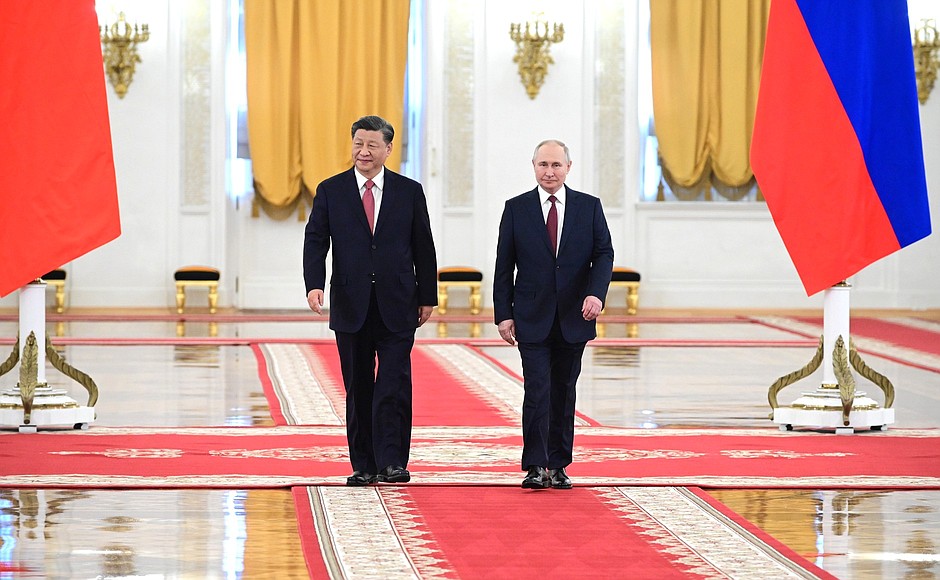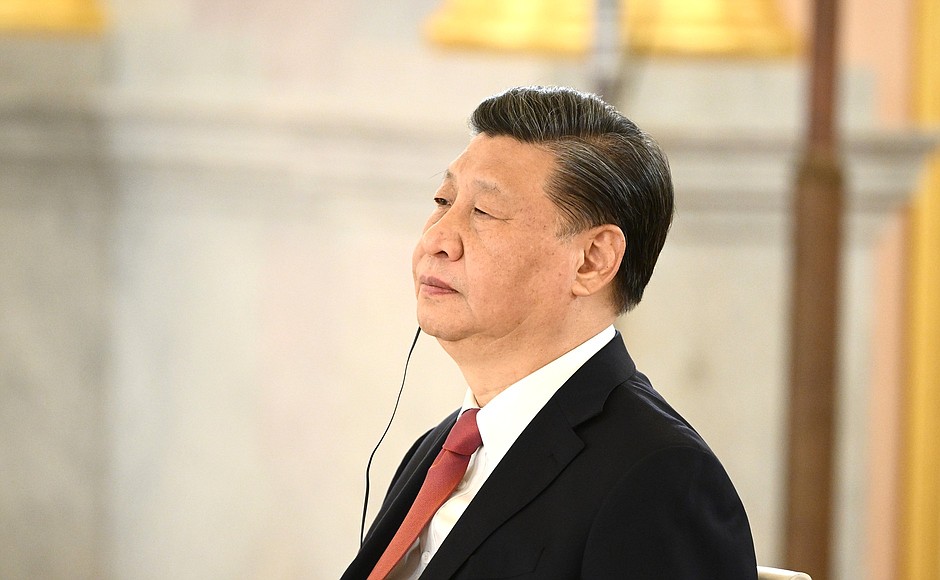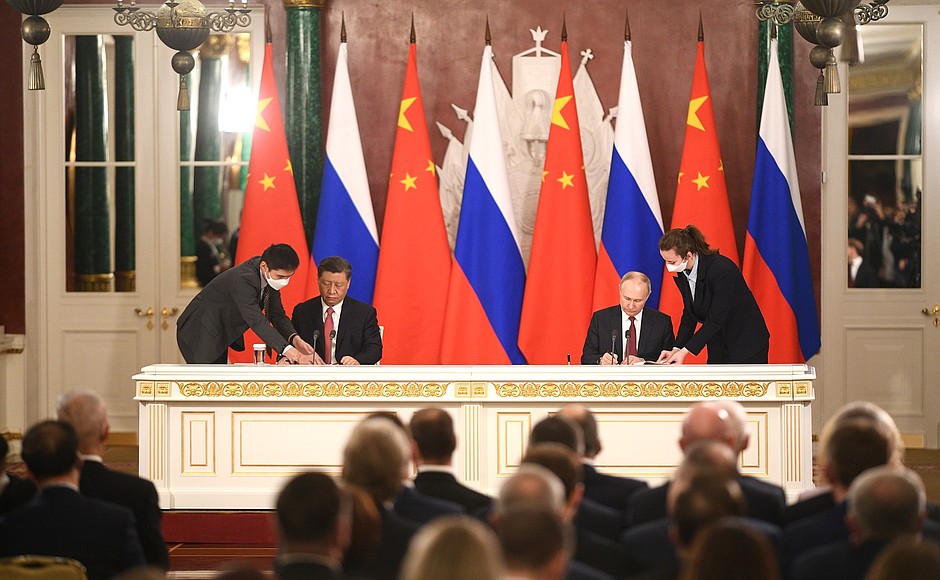Pictures and Facts: Vladimir Putin and President of the People’s Republic of China Xi Jinping
Vladimir Putin and President of the People’s Republic of China Xi Jinping are holding talks at the Kremlin.
After the official ceremony held at St George’s Hall of the Grand Kremlin Palace, Vladimir Putin and Xi Jinping began talks.
The two leaders are discussing current issues of the further development of the comprehensive partnership and strategic interaction between Russia and China, and deepening cooperation on the international stage.
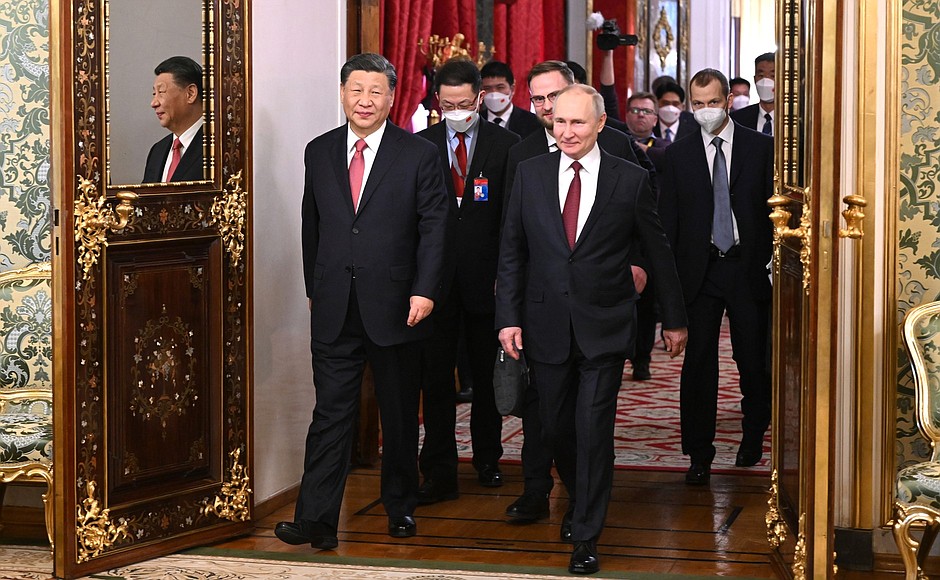
President of China Xi Jinping is currently in Russia on a three-day state visit at Vladimir Putin’s invitation. On March 20, the two leaders held a meeting.
Russian-Chinese consultations continued in an expanded format.
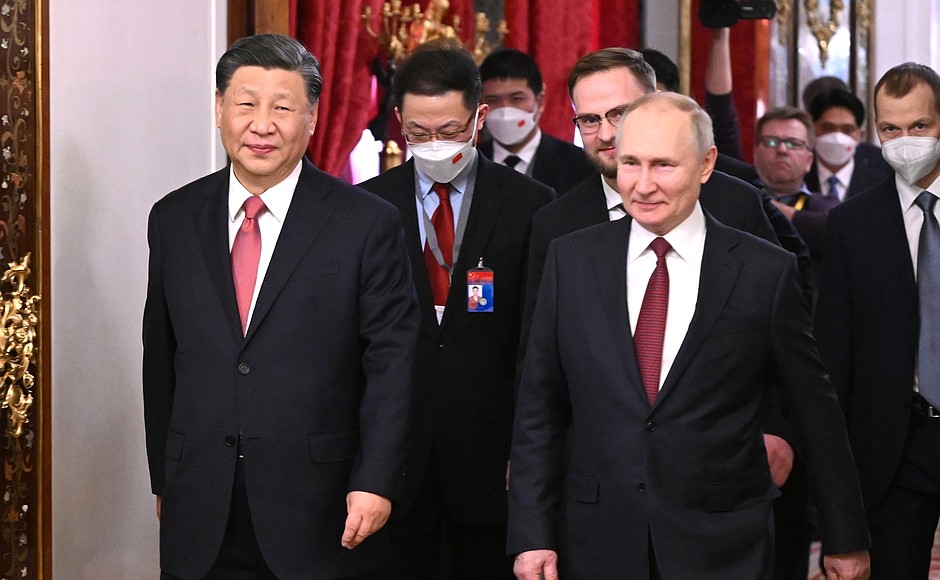
As part of Xi Jinping’s state visit, Russia and China signed the Joint Statement on Deepening the Russian-Chinese Comprehensive Partnership and Strategic Cooperation for a New Era, as well as the Joint Statement by the President of Russia and the President of China on the Plan to Promote the Key Elements of Russian-Chinese Economic Cooperation until 2030.
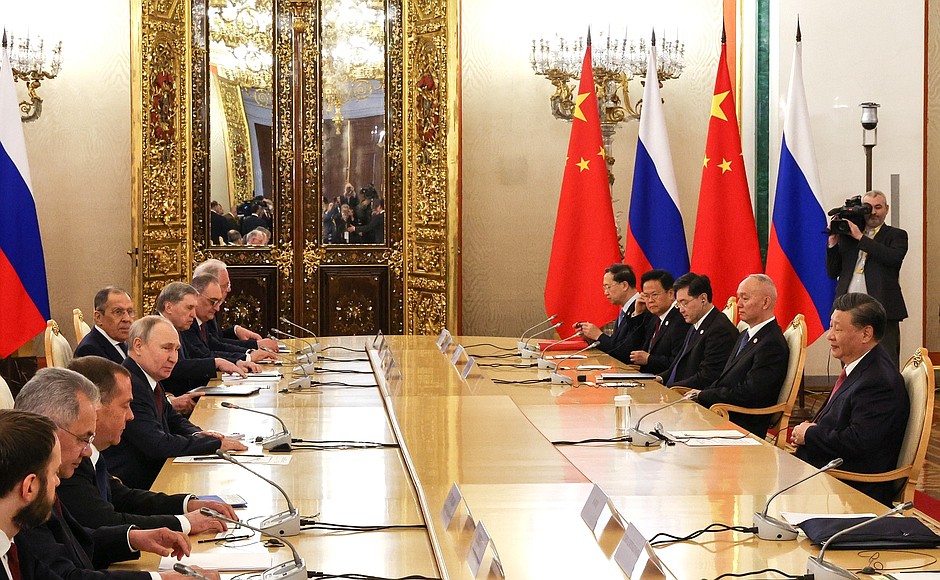
The package of documents signed during the visit includes an intergovernmental agreement on cooperation in the joint production of television programmes, as well as documents concerning cooperation between the National State Television and Radio Broadcasting Company (VGTRK) and the China Media Group, and on the exchange of information and cooperation between Russia’s ITAR-TASS news agency and the Xinhua News Agency.
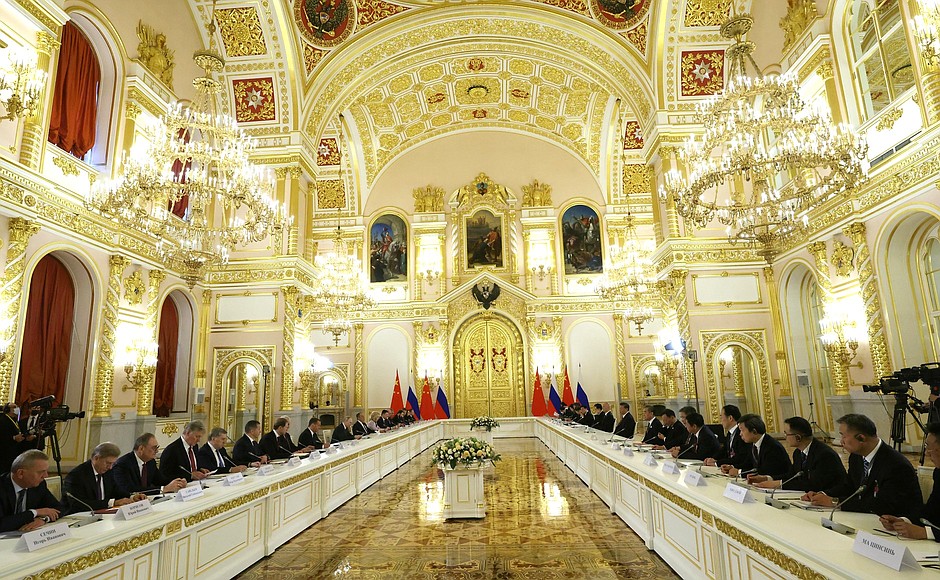
The relevant ministries signed memorandums of understanding aimed at deepening cooperation in trade shows and exhibitions, in the management and use of forest resources, in soybean production, as well as industrial and infrastructure cooperation under preferential terms in the Russian Far East.
The Russian Ministry of Science and Higher Education, the Chinese Ministry of Science and Technology, the Joint Institute for Nuclear Research and the Chinese Academy of Sciences signed a Protocol on Strengthening Cooperation in Fundamental Scientific Research.
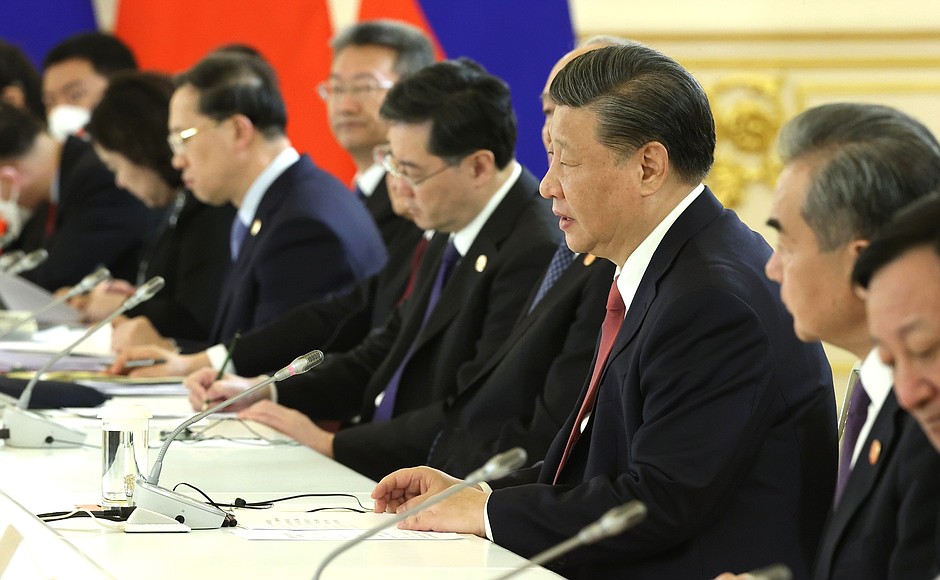
The Rosatom State Atomic Energy Corporation and the Chinese Atomic Energy Authority also signed a Comprehensive Long-term Cooperation Programme on fast neutron reactors and closed nuclear fuel cycle development.
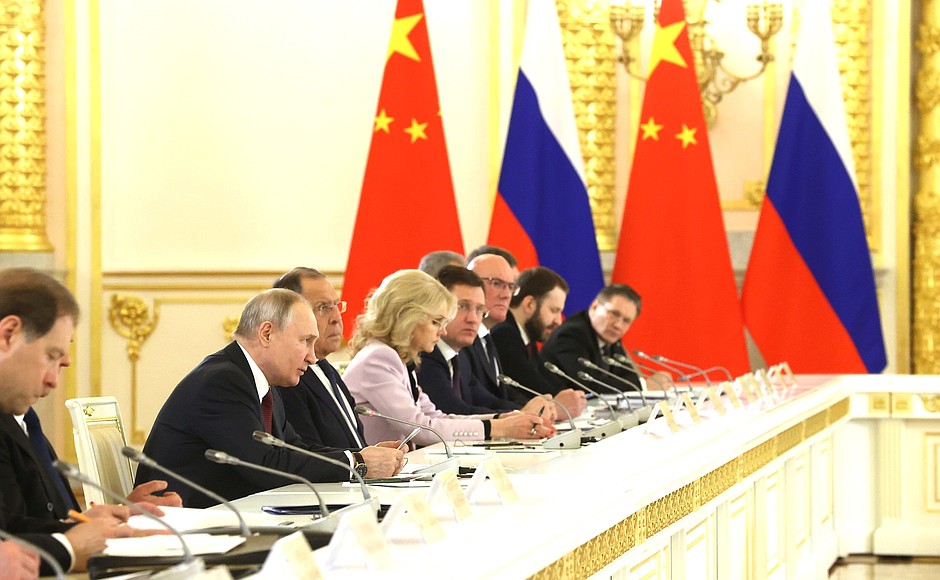
In addition, the relevant state agencies signed memorandums of understanding and cooperation regarding consumer protection and deeper cooperation in the management of state companies.
***
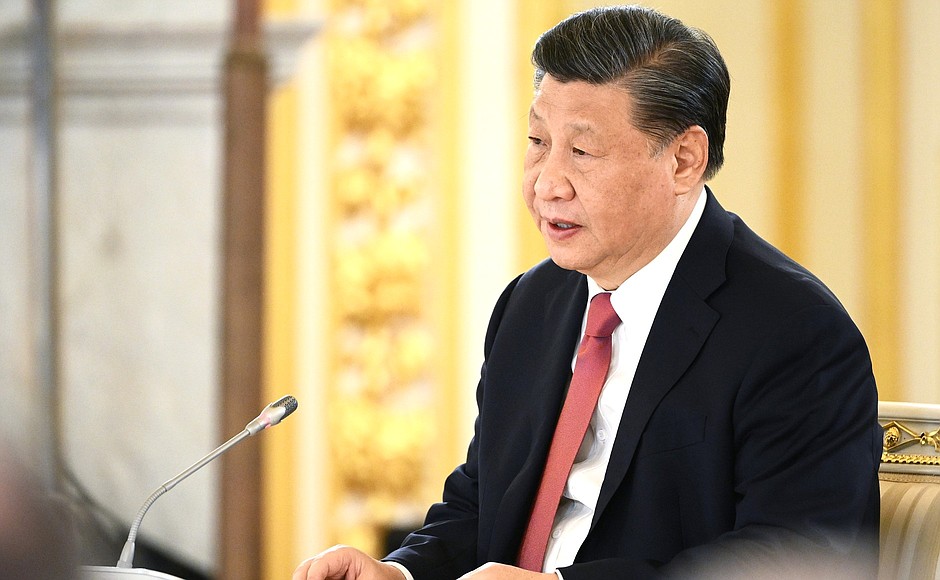
Beginning of Russian-Chinese expanded talks
President of Russia Vladimir Putin: President, colleagues, friends,
President of the People’s Republic of China Xi Jinping has a rather packed agenda for his state visit.
Yesterday evening, we had a detailed discussion of all matters related to the bilateral agenda, as well as topical international and regional issues.
We have just completed our talks in a narrow format, where we had quite a meaningful and frank exchange of opinions on the potential we have for further expanding Russian-Chinese ties and better coordinating our actions on the international stage.
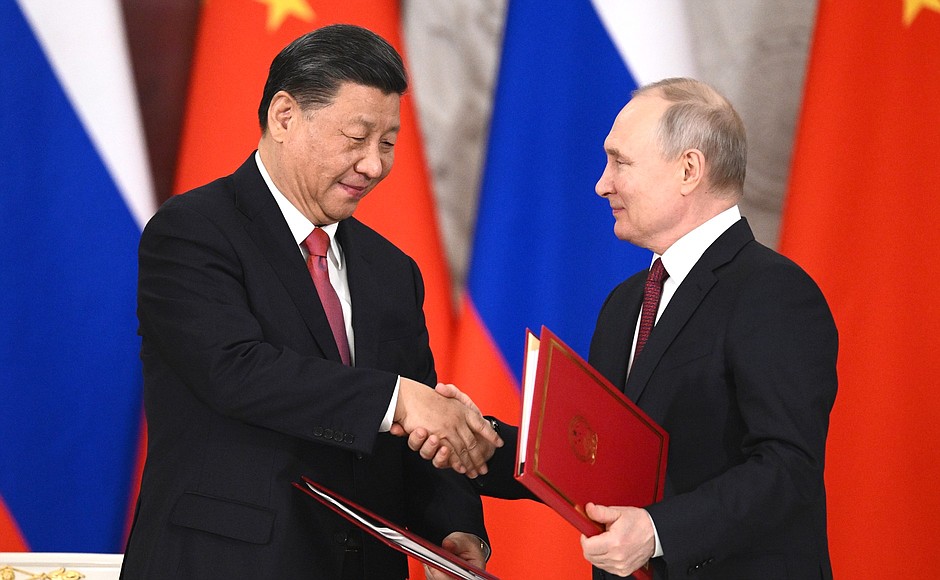
We are now meeting in an expanded format in the presence of our delegations, so that we can review in detail practical aspects of our cooperation in various spheres.
Let me remind you that in December 2022, Mr Xi Jinping and I agreed during our talks via videoconference to consider setting new benchmarks for our cooperation, including both quantitative, as well as qualitative indicators.
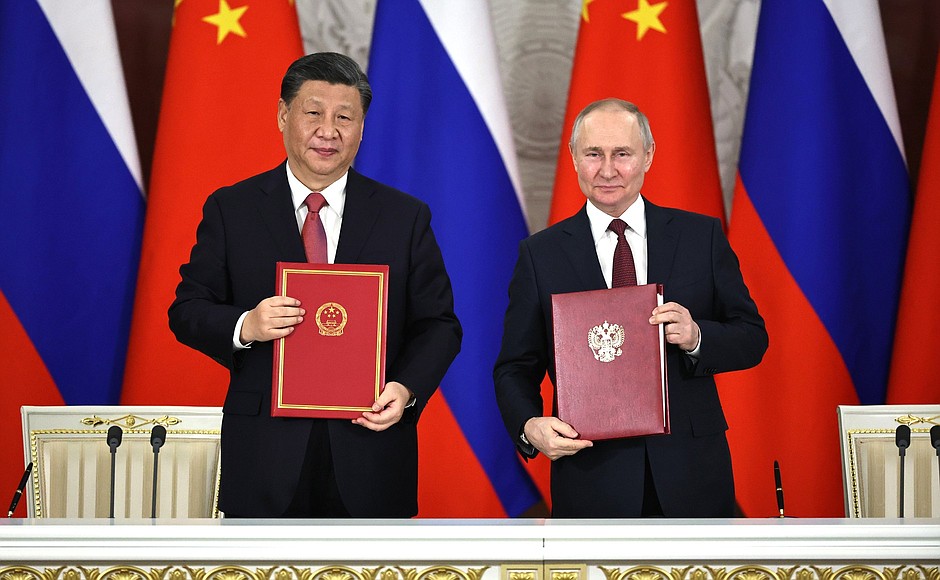
These agreements paved the way to the drafting of two major conceptual documents for this visit. I am referring to the Joint Statement on Deepening the Russian-Chinese Comprehensive Partnership and Strategic Cooperation for a New Era, as well as the Joint Statement on the Plan to Promote the Key Elements of Russian-Chinese Economic Cooperation until 2030.
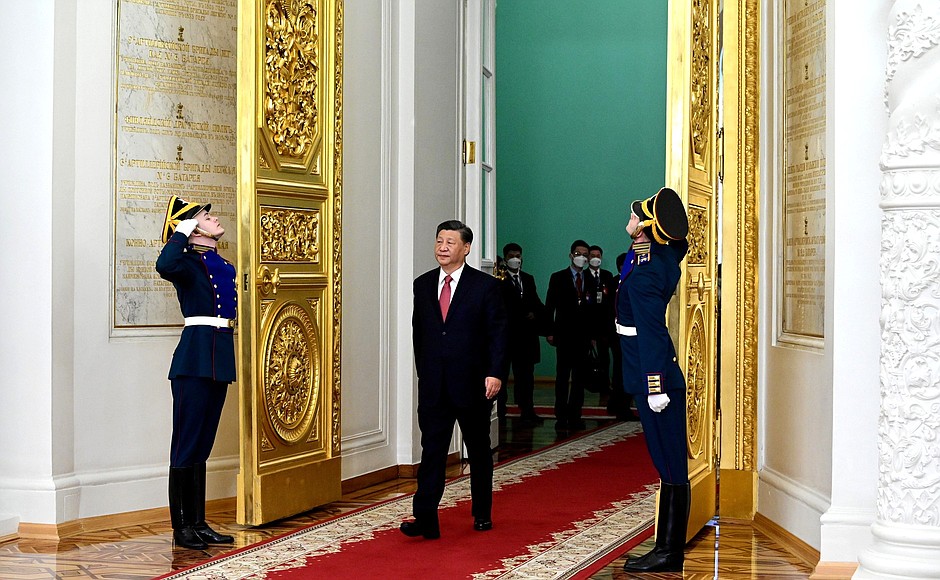
These two documents set forth long-term goals for the governments, businesses and civil society of our two countries in terms of delivering on the objectives we share, which deal with facilitating national development in all areas.
Regular meetings between our heads of government will serve as a focal point for delivering on this ambitious objective, and the agenda for this mechanism will cover Russian-Chinese cooperation in all its aspects.
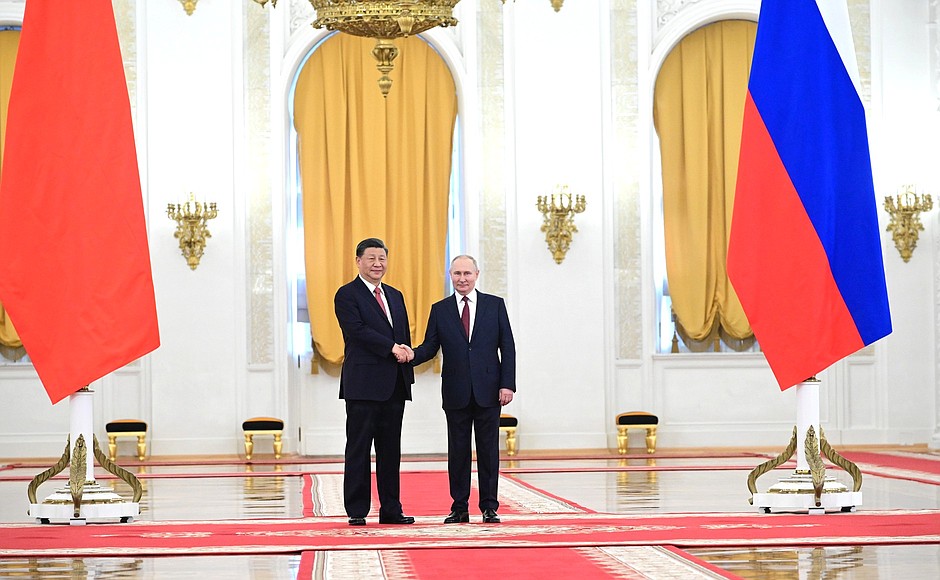
Despite the consequences of the pandemic and the sanctions pressure, trade reached a historic high of $185 billion in 2022. This year, we expect Russian-Chinese trade not only to reach $200 billion, as we agreed with our friends earlier, several years ago, but to go beyond this threshold. As I have already said, trade increased by more than 30 percent over the past year.
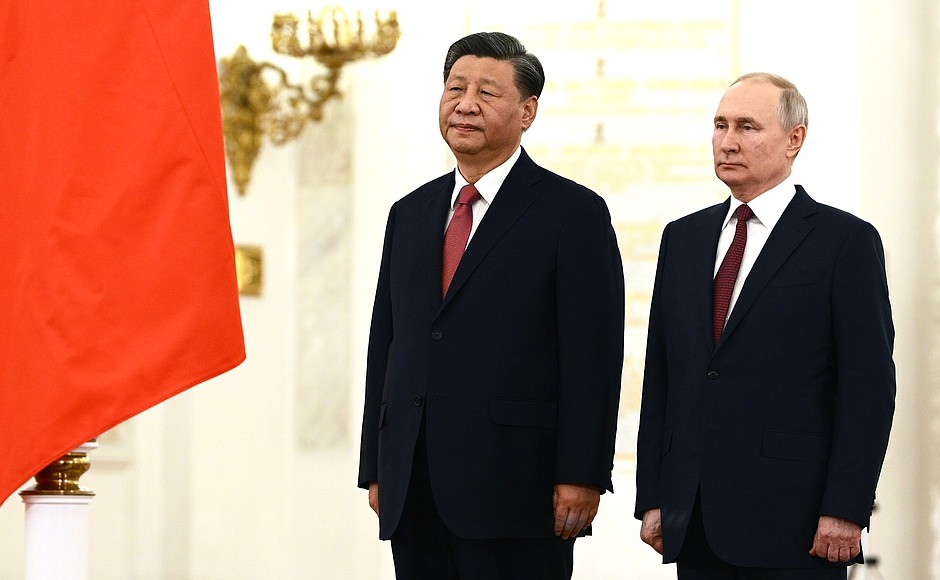
The project to align the EAEU and the Chinese President’s Belt and Road initiative opens up further potential for our economies.
When it comes to investment, our countries have compiled a package of 80 important and promising bilateral projects in various fields worth around $165 billion.
Energy cooperation is expanding. Russia is a strategic supplier of oil, natural gas, including LNG, coal, and electricity to China. The construction of nuclear power facilities continues according to schedule. Russian business can meet the Chinese economy’s growing demand for energy, both in terms of the projects currently underway and those that are still in the works.
Russian gas supplies to China are to reach at least 98 billion cubic metres by 2030, plus 100 million tonnes of liquefied natural gas. We have just discussed a good project, the new Power of Siberia-2 gas pipeline across Mongolia. We have reached agreement on most of the deal’s parameters. Russia will export 50 billion cubic metres of gas from reliable, stable supplies.
It is important that our national currencies are increasingly used in bilateral trade. We should continue promoting settlements in national currencies, and expand the reciprocal presence of financial and banking structures in our countries’ markets. As I have already said, at this stage, two-thirds of payments under trade deals between our countries are made in rubles and yuan.
We support using Chinese yuan in transactions between the Russian Federation and its partners in Asia, Africa and Latin America. I am sure that these types of payment will grow between Russian businesses and their counterparts in third countries – as I said – payments in yuan.
Industrial cooperation is deepening. We have good experience working together in civil aircraft construction, shipbuilding, and auto manufacturing. We stand ready to support Chinese businesses in replacing the Western enterprises that left Russia.
Trade in agricultural produce is growing even faster – by 41.4 percent in 2022, when it reached $7 billion in terms of value; importantly, the growth was balanced on both sides – by equal amounts.
The relevant ministries and agencies are working to ensure that there are high quality standards for the products supplied, and improving the regulations for mutual access to food products.
Due to these improvements, we can expect further growth in Russian food exports to the capacious Chinese market and will contribute to raising the level of food security in both countries.
Technological sovereignty is the key to sustainability. We propose further improving strategic partnerships in specific industries. By combining our wealth of research capacity and industrial capabilities, Russia and China can become world leaders in information technology, cyber security, and artificial intelligence.
Stronger ties between regions help diversify our cooperation, above all in trade and investment. China has become Russia’s leading partner in exploring the economic potential of the Far East. Today investors from China are implementing 52 projects worth $10.8 billion in total on priority development territories, as well as the free port of Vladivostok.
In total, Russia and China now have 366 partnerships, including 135 between regions and 231 between municipalities; and 59 Russian regions have agreements with Chinese regions. About 100 municipalities have sister municipalities and partners in China.
The transport and logistics infrastructure is being improved. Our countries have a long land border, so the formation of China-Europe railway and road corridors through Russian territory remains an absolute priority in order to meet the needs of growing cargo and passenger traffic.
Last year, the Blagoveshchensk-Heihe motor bridge was opened in June, and the Nizhneleninskoye-Tongjiang railway bridge was put into operation in November. The launch of traffic on bridges will reduce the cost and time of transporting goods between Russia and China, expand the geography of trade and increase the volume of transit with Asia-Pacific countries.
We believe the cooperation with Chinese partners in developing the transit potential of the Northern Sea Route is promising. As I have said, we are ready to create a joint working body to develop the Northern Sea Route.
Tourist and youth exchanges, as well as contacts in the field of science, culture and education are being restored after the pandemic. In 2022, 6,500 Russian students studied at Chinese universities, including 1,600 in China, with the rest attending remotely. More than 37,000 students from China were trained in Russia. Once coronavirus restrictions are lifted, we expect student exchanges to increase many times over.
More than a hundred events have been held as part of the cross-years of fitness and sports that are currently taking place. Bilateral sports ties are becoming particularly important in today’s difficult conditions, when the Olympic Movement is becoming more and more politically biased, and Western countries are trying to use sports for unseemly purposes as an instrument of pressure. We support work towards the creation of an appropriate sports association within the Shanghai Cooperation Organisation.
I believe that our multipronged and mutually beneficial cooperation will continue to grow stronger for the benefit of our countries’ peoples.
And now, of course, I am pleased to give the floor to our guest and friend, Mr Xi Jinping, President of the People’s Republic of China.
President of the People’s Republic of China Xi Jinping (retranslated): Mr President,
I would like to thank you again for your invitation to visit Russia.
Through our common efforts, Cino-Russian relations are evolving at a sound and sustainable pace. Mutual political trust between our countries is deepening, common interests are multiplying, our nations are growing closer, and cooperation in the trade, economic, investment, energy, cultural, humanitarian and interregional dimensions is advancing.
Yesterday, during our informal meeting, and during the talks with Prime Minister Mishustin, as well as during our talks in a narrow format, we had a deep exchange of views on cooperation matters. The scope of our sphere of cooperation is constantly expanding. Our cooperation has achieved significant results. Further development of interaction is being successfully implemented. President Putin has just mentioned this.
In China, this year marks the beginning of the full realisation of the spirit of the 20th Congress of the CPC. We will intensify the formation of a new development architecture, prioritise high-quality development, and comprehensively promote Chinese modernisation.
I know that Russia is rapidly implementing national development goals until 2030. I propose strengthening coordination and interaction in order to derive additional benefits from practical cooperation.
Mr President, I am prepared to join you in outlining a plan for the development of bilateral relations and practical cooperation in the interests of the prosperity and revival of China and Russia.
This concludes my opening remarks. Thank you.
Vladimir Putin: Thank you very much, esteemed Mr President.





